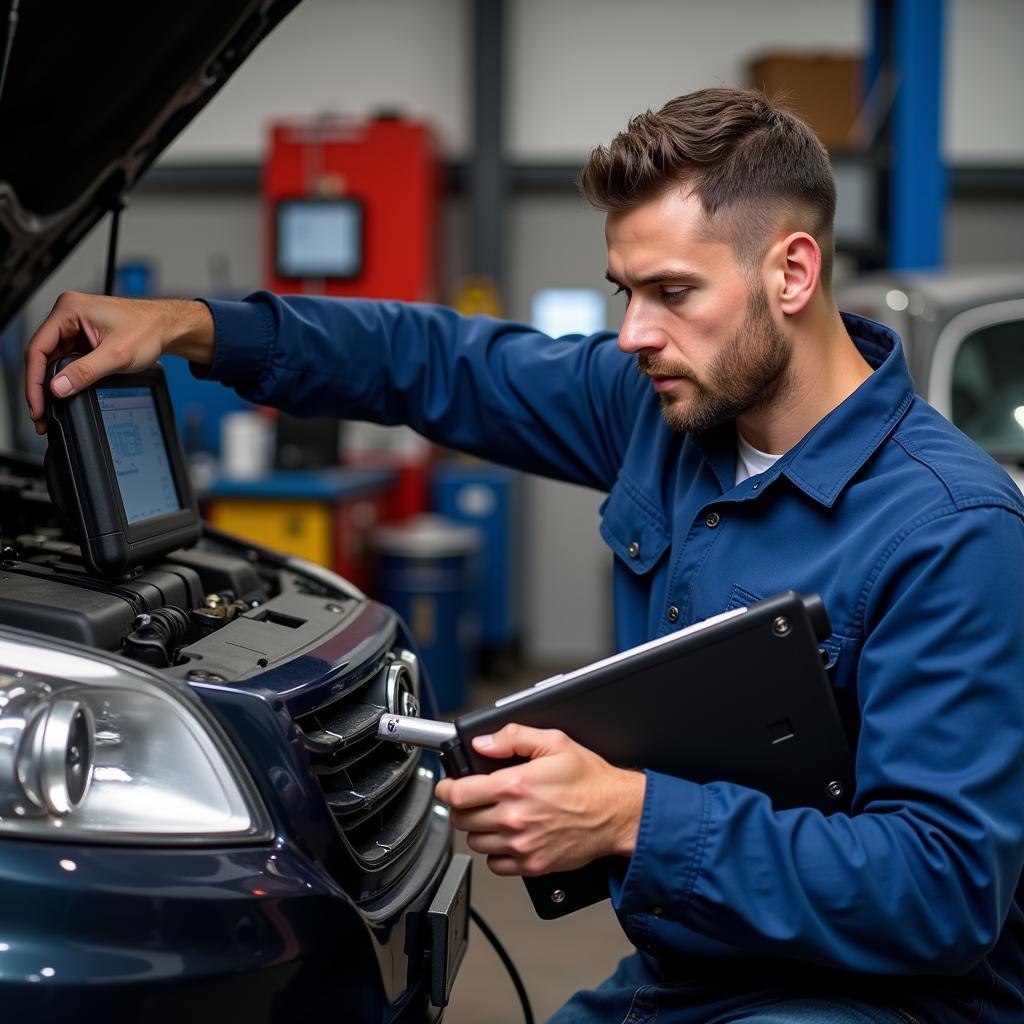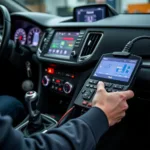Finding the right diagnostic computer for your car can feel like navigating a maze. With so many options available, it’s easy to get lost in technical jargon and conflicting information. But don’t worry, we’re here to guide you. Whether you’re a seasoned mechanic or a car enthusiast looking to do DIY repairs, this comprehensive guide will equip you with the knowledge to make an informed decision about the best diagnostic computer for your needs.
Understanding Car Diagnostic Computers
Before we delve into the specifics, let’s clarify what a car diagnostic computer is and why it’s become indispensable in modern automotive repair. In essence, a diagnostic computer is a sophisticated device that acts as a window into your car’s computer system. It allows you to communicate with the various electronic control units (ECUs) in your car, retrieve diagnostic trouble codes (DTCs), and monitor live data streams from sensors.
Why You Need a Diagnostic Computer
Gone are the days when mechanics relied solely on their intuition and experience to pinpoint car problems. Today’s vehicles are complex machines, controlled by an intricate network of sensors, actuators, and ECUs. When a problem arises, the car’s computer system logs a DTC, which essentially serves as a digital breadcrumb trail leading you to the root of the issue.
Here are some compelling reasons why a diagnostic computer is a worthwhile investment:
- Accurate Diagnosis: A diagnostic computer provides precise information about the nature of a car problem, eliminating guesswork and potentially costly misdiagnoses.
- Early Detection: By monitoring live data streams, you can detect potential problems before they escalate into major repairs.
- Cost Savings: Diagnosing problems yourself can save you significant amounts of money on expensive mechanic fees.
- Enhanced Understanding: Using a diagnostic computer provides a deeper understanding of how your car’s systems work.
Types of Diagnostic Computers
The market offers a wide range of diagnostic computers, each catering to different needs and budgets.
1. Basic Code Readers: As the name suggests, these entry-level devices are primarily designed to read and clear basic DTCs. They are an affordable option for casual users who want to perform simple diagnostics.
2. OBD-II Scanners: OBD-II scanners offer more advanced functionality compared to basic code readers. They can access manufacturer-specific codes, display live data streams, and perform some bi-directional control tests.
3. Professional-Grade Diagnostic Tools: These high-end devices are typically used by professional mechanics and offer a comprehensive suite of features. They can perform complex diagnostics, program modules, and provide in-depth technical information.
Choosing the Right Diagnostic Computer
Selecting the best diagnostic computer depends on your specific requirements. Here are some key factors to consider:
1. Vehicle Compatibility: Ensure the diagnostic computer is compatible with your car’s make, model, and year.
2. Features: Consider the features that are important to you, such as code reading, live data streaming, bi-directional control, and special functions.
3. User Friendliness: Choose a device with an intuitive interface and software that is easy to navigate.
4. Budget: Determine your budget and explore options that offer the best value for your money.
Maximizing Your Diagnostic Computer
To fully leverage the capabilities of your diagnostic computer, consider these tips:
- Regular Scans: Perform regular scans even if your car seems to be running smoothly. This proactive approach can help identify potential problems early on.
- Research Codes: Take the time to thoroughly research any DTCs that your diagnostic computer retrieves. Online resources and forums can provide valuable insights.
- Update Software: Regularly update the software of your diagnostic computer to ensure optimal performance and access to the latest features.
Conclusion
A diagnostic computer for your car is no longer a luxury but a necessity in today’s technologically advanced automotive landscape. By investing in the right diagnostic computer and using it effectively, you can empower yourself to take control of your car’s maintenance, save money on repairs, and enjoy peace of mind knowing that you have a reliable tool at your disposal. Remember, knowledge is power, and a diagnostic computer is your key to unlocking a wealth of information about your vehicle.
Frequently Asked Questions (FAQs)
1. Can I use any diagnostic computer on any car?
No, not all diagnostic computers are compatible with every car. You need to choose a device that supports your car’s make, model, and year.
2. What is the difference between OBD-I and OBD-II?
OBD-I was an earlier standard for vehicle diagnostics, while OBD-II is the current standard used in most modern vehicles. OBD-II offers more standardized protocols and data access.
3. What are live data streams, and why are they important?
Live data streams provide real-time information from various sensors in your car, such as engine RPM, coolant temperature, and oxygen sensor readings. This information can help you diagnose problems and monitor the health of your car’s systems.
4. Can I program car keys or modules with a diagnostic computer?
Some diagnostic computers, particularly professional-grade models, offer key programming and module programming capabilities. However, these functions often require specialized software and knowledge.
5. What should I do if my diagnostic computer can’t communicate with my car?
If your diagnostic computer is unable to establish communication with your car, double-check the connection, ensure the ignition is turned on, and verify that the device is compatible with your vehicle. If the problem persists, consult the user manual or contact the manufacturer’s support.
6. What is Maxisys car diagnostic?
7. Where can I find reliable Halfords car diagnostic code’s?
Need Help? Contact Us!
For any assistance or inquiries regarding car diagnostics and suitable tools, our dedicated team is available 24/7 to assist you. Feel free to reach out to us via:
- WhatsApp: +1(641)206-8880
- Email: [email protected]
We strive to provide exceptional customer service and ensure your car diagnostic needs are met with the utmost care and expertise.


